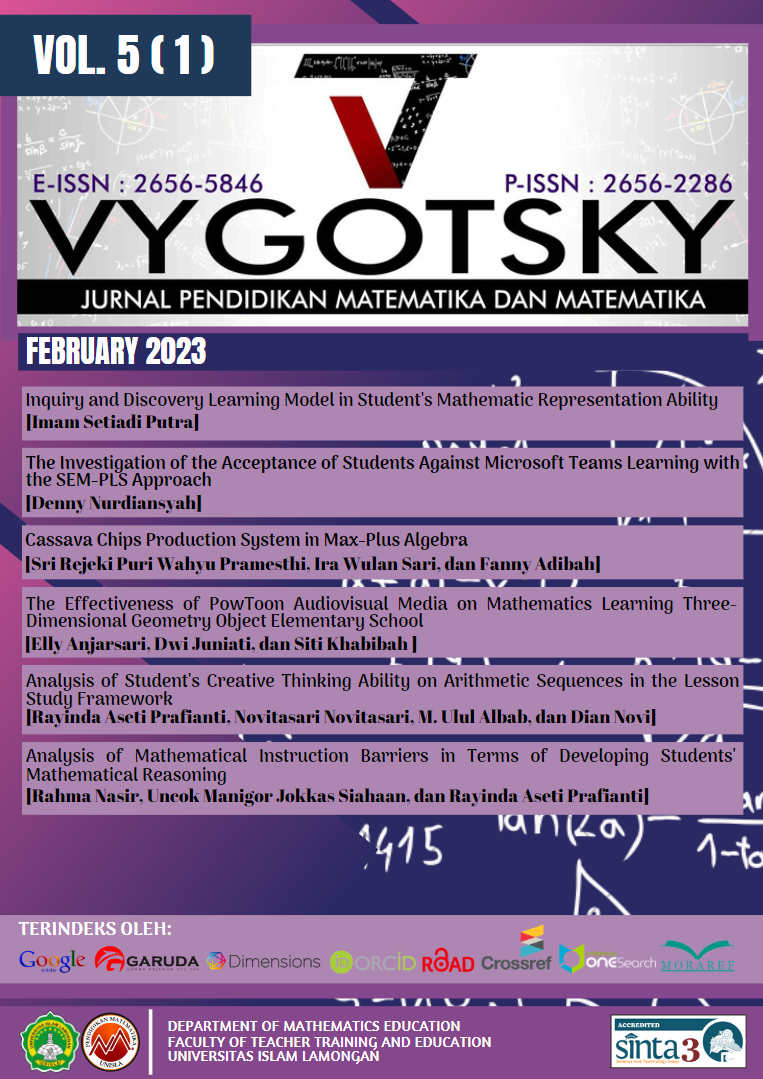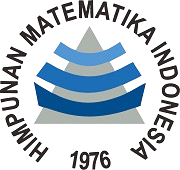Analysis of Mathematical Instruction Barriers in Terms of Developing Students' Mathematical Reasoning
DOI:
https://doi.org/10.30736/voj.v5i1.723Keywords:
Difficulties, Mathematical reasoning, Motivation, Student engagementAbstract
This study aims to analyze the difficulty of teachers in implementing learning that focuses on improving students' mathematical reasoning abilities. The study was a descriptive study. Data were collected via an online form that included open-ended questions. Data were collected from 93 mathematics teachers. Data were analyzed by coding qualitative data using spreadsheet in Microsoft Excel. The categories were derived from the participants’ own words or phrases. The results showed that 81.2 percent of respondents stated that the difficulty teachers experience to improve students' mathematical reasoning abilities is the lack of motivation and disengagement of students and other difficulties. This research also presents alternative solutions that can be practiced by teachers in their respective classes.Downloads
References
Abassian, A., Safi, F., Bush, S., & Bostic, J. (2019). Five different perspectives on mathematical modeling in mathematics education. Investigations in Mathematics Learning, 12(1), 53–65. https://doi.org/10.1080/19477503.2019.1595360
Alsina, Ã., & Mulà , I. (2019). Advancing towards a Transformational Professional Competence Model through Reflective Learning and Sustainability: The Case of Mathematics Teacher Education. Sustainability 2019, Vol. 11, Page 4039, 11(15), 4039. https://doi.org/10.3390/SU11154039
Baker, C. K., Galanti, T. M., Kraft, T., Holincheck, N., Hjalmarson, M., & Nelson, J. K. (2022). Researchers as Coaches: Developing Mathematics Teaching Capacity Using MEAs for STEM Integration. Investigations in Mathematics Learning, 14(1), 28–48. https://doi.org/10.1080/19477503.2021.2023966
Boaler, J. (2014). Research suggests timed tests cause math anxiety. Teaching Children Mathematics, 20(8), 469–474. https://doi.org/10.4155/ppa.14.21
Clarke, D., & Roche, A. (2018). Using contextualized tasks to engage students in meaningful and worthwhile mathematics learning. The Journal of Mathematical Behavior, 51, 95–108. https://doi.org/10.1016/J.JMATHB.2017.11.006
Denton, M., Borrego, M., & Boklage, A. (2020). Community cultural wealth in science, technology, engineering, and mathematics education: A systematic review. Journal of Engineering Education, 109(3), 556–580. https://doi.org/10.1002/JEE.20322
Dewi, N., Chetty, S., Handayani, L., Sahabudin, N. A., Ali, Z., Hamzah, N., Shamsiah, N., Rahman, A., & Kasim, S. (2019). Learning Styles and Teaching Styles Determine Students’ Academic Performances. International Journal of Evaluation and Research in Education, 8(4), 610–615. https://doi.org/10.11591/ijere.v8i3
Goldenberg, E. P., Cuoco, A. A., & Carter, C. J. (2021). The Missing Element for Teachers: Learning What Mathematics Is. 51–87. https://doi.org/10.1007/978-3-030-68956-8_3
Herbert, S. (2019). Challenges in Assessing Mathematical Reasoning. Mathematics Education Research Group of Australasia, 348–355.
Hoeve, M. van, Doorman, M., & Veldhuis, M. (2019). How can teachers influence their students’ (mathematical) mindset? TWG08(23). https://hal.archives-ouvertes.fr/hal-02410257
Hunt, J. H., Martin, K., Patterson, B., & Khounmeuang, A. (2022). Special educators’ knowledge of student mathematical thinking. Journal of Mathematics Teacher Education, 25(5), 581–598. https://doi.org/10.1007/S10857-021-09508-1/METRICS
Ilie, S., Rose, P., & Vignoles, A. (2021). Understanding higher education access: Inequalities and early learning in low and lower-middle-income countries. British Educational Research Journal, 47(5), 1237–1258. https://doi.org/10.1002/BERJ.3723
Joutsenlahti, J., & Perkkilä, P. (2019). Sustainability Development in Mathematics Education—A Case Study of What Kind of Meanings Do Prospective Class Teachers Find for the Mathematical Symbol “23� Sustainability 2019, Vol. 11, Page 457, 11(2), 457. https://doi.org/10.3390/SU11020457
Keddie, N. (2019). Classroom Knowledge. Classrooms and Staffrooms, 108–122. https://doi.org/10.4324/9780367823221-9
Kurniawan, H., Budiyono, Sajidan, & Siswandari. (2021). The PRINTER Learning Model to Enhance Higher Order Thinking and Communication Skill in Algebra. International Journal of Instruction, 14(3), 359–374. https://doi.org/10.29333/iji.2021.14321a
Laursen, S. L., & Rasmussen, C. (2019). I on the Prize: Inquiry Approaches in Undergraduate Mathematics. International Journal of Research in Undergraduate Mathematics Education, 5(1), 129–146. https://doi.org/10.1007/S40753-019-00085-6/METRICS
Maass, K., Geiger, V., Ariza, M. R., & Goos, M. (2019). The Role of Mathematics in interdisciplinary STEM education. ZDM - Mathematics Education, 51(6), 869–884. https://doi.org/10.1007/S11858-019-01100-5/METRICS
Mamun, M. A. al, Lawrie, G., & Wright, T. (2020). Instructional design of scaffolded online learning modules for self-directed and inquiry-based learning environments. Computers & Education, 144, 103695. https://doi.org/10.1016/J.COMPEDU.2019.103695
Martin, J. (2019). Building Relationships and Increasing Engagement in the Virtual Classroom: Practical Tools for the Online Instructor. Journal of Educators Online, 16(1). www.useloom.com
Mazana, Y. M., Suero Montero, C., & Olifage, C. R. (2019). Investigating Students’ Attitude towards Learning Mathematics. International Electronic Journal of Mathematics Education, 14(1). https://doi.org/10.29333/IEJME/3997
Mikami, A. Y., Owens, J. S., Hudec, K. L., Kassab, H., & Evans, S. W. (2020). Classroom Strategies Designed to Reduce Child Problem Behavior and Increase Peer Inclusiveness: Does Teacher Use Predict Students’ Sociometric Ratings? School Mental Health, 12(2), 250–264. https://doi.org/10.1007/S12310-019-09352-Y/METRICS
Okolie, U. C., Igwe, P. A., Mong, I. K., Nwosu, H. E., Kanu, C., & Ojemuyide, C. C. (2021). Enhancing students’ critical thinking skills through engagement with innovative pedagogical practices in Global South. HigherEducation Research & Development, 41(4), 1184–1198. https://doi.org/10.1080/07294360.2021.1896482
Redman, E., Wiek, A., & Redman, A. (2018). Continuing Professional Development in Sustainability Education for K-12 Teachers: Principles, Programme, Applications, Outlook: Sage Journals, 12(1), 59–80. https://doi.org/10.1177/2455133318777182
Sasson, I., Yehuda, I., Miedijensky, S., & Malkinson, N. (2022). Designing new learning environments: An innovative pedagogical perspective. The Curriculum Journal, 33(1), 61–81. https://doi.org/10.1002/CURJ.125
Schoevers, E. M., Leseman, P. P. M., Slot, E. M., Bakker, A., Keijzer, R., & Kroesbergen, E. H. (2019). Promoting pupils’ creative thinking in primary school mathematics: A case study. Thinking Skills and Creativity, 31, 323–334. https://doi.org/10.1016/J.TSC.2019.02.003
Shagiakhmetova, M. N., Bystritskaya, E. v., Demir, S., Stepanov, R. A., Grishnova, E. E., & Kryukova, N. I. (2022). Primary Teachers Difficulties Related to Compulsory Distance Education During COVID-19. Contemporary Educational Technology, 14(2), ep357. https://doi.org/10.30935/CEDTECH/11589
Shimizu, Y. (2020). Lesson Study in Mathematics Education. Encyclopedia of Mathematics Education, 472–474. https://doi.org/10.1007/978-3-030-15789-0_91
Son, A. L., Darhim, & Fatimah, S. (2020). Students’ Mathematical Problem-Solving Ability Based on Teaching Models Intervention and Cognitive Style. Journal on Mathematics Education, 11(2), 209–222. https://doi.org/10.22342/jme.11.2.10744.209-222
Strauß, S., & Rummel, N. (2020). Promoting interaction in online distance education: designing, implementing and supporting collaborative learning. Information and Learning Science, 121(5–6), 251–260. https://doi.org/10.1108/ILS-04-2020-0090/FULL/XML
Thibodeaux, T., Harapnuik, D., & Cummings, C. (2019). Student Perceptions of the Influence of Choice, Ownership, and Voice in Learning and the Learning Environment. International Journal of Teaching and Learning in Higher Education, 31(1), 50–62. http://www.isetl.org/ijtlhe/
Valente, S., Monteiro, A. P., & Lourenço, A. A. (2019). The relationship between teachers’ emotional intelligence and classroom discipline management. Psychology in the Schools, 56(5), 741–750. https://doi.org/10.1002/PITS.22218
Verschaffel, L., Rathé, S., Wijns, N., Degrande, T., van Dooren, W., de Smedt, B., & Torbeyns, J. (2020). Young Children’s Early Mathematical Competencies: The Role of Mathematical Focusing Tendencies. Mathematics Education in the Early Years, 23–42. https://doi.org/10.1007/978-3-030-34776-5_2
Wahono, B., & Chang, C. Y. (2019). Assessing Teacher’s Attitude, Knowledge, and Application (AKA) on STEM: An Effort to Foster the Sustainable Development of STEM Education. Sustainability 2019, Vol. 11, Page 950, 11(4), 950. https://doi.org/10.3390/SU11040950
Wiberg, M. (2019). The relationship between TIMSS mathematics achievements, grades, and national test scores. Education Inquiry, 10(4), 328–343. https://doi.org/10.1080/20004508.2019.1579626
Wu, X., Zhang, Y., Wu, R., & Chang, H. H. (2022). A comparative study on cognitive diagnostic assessment of mathematical key competencies and learning trajectories: ——PISA Data Analysis Based on 19, 454 Students from 8 Countries. Current Psychology, 41(11), 7854–7866. https://doi.org/10.1007/S12144-020-01230-0/METRICS
Xu, B., Cai, J., Liu, Q., & Hwang, S. (2020). Teachers’ predictions of students’ mathematical thinking related to problem posing. International Journal of Educational Research, 102, 101427. https://doi.org/10.1016/J.IJER.2019.04.005
Zilda, Y. H., & Padang, K. (2022). Improving learning activities and mathematical reasoning skills for class x students applying problem-based learning. Jurnal EDUCATIO: Jurnal Pendidikan Indonesia, 8(1), 79–86. https://doi.org/10.29210/1202222219
Zubaidah Amir, M. Z., Urrohmah, A., & Andriani, L. (2021). The effect of application of realistic mathematics education (RME) approach to mathematical reasoning ability based on mathematics self efficacy of junior high school students in Pekanbaru. Journal of Physics: Conference Series, 1776(1), 012039. https://doi.org/10.1088/1742-6596/1776/1/012039
Downloads
Published
How to Cite
Issue
Section
License
Copyright:
Authors who publish their manuscripts in this Journal agree to the following conditions:
- Copyright of any article on Vygotsky: Jurnal Pendidikan Matematika dan Matematika is held solely by the author under the Creative Commons Attribution 4.0 International license (CC BY NC SA).
- Authors can submit papers separately, arrange non-exclusive distribution of manuscripts that have been published in this journal into other versions (e.g. sending to the author's institutional repository, publication in a book, etc.) by acknowledging that the manuscript has been published for the first time in Vygotsky: Jurnal Pendidikan Matematika dan Matematika.
License:
Vygotsky: Jurnal Pendidikan Matematika dan Matematika is published under the terms of the Creative Commons Attribution 4.0 International License (CC BY NC SA). This license permits anyone to copy and redistribute this material in any form or format, compile, modify and develop this material for any purpose as long as it is not for commercial purposes. Additionally, anyone must provide credit and distribute contributions under the license of the creator of the original work.







